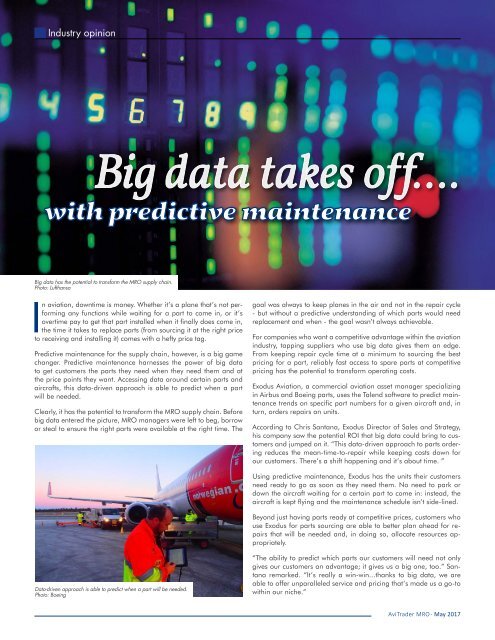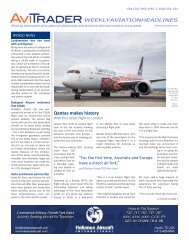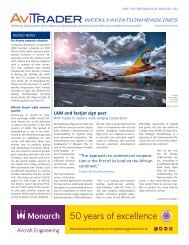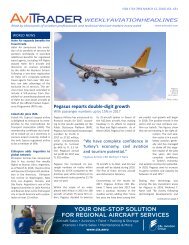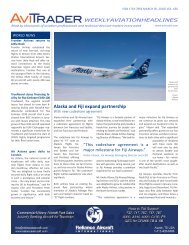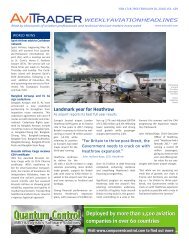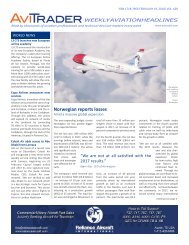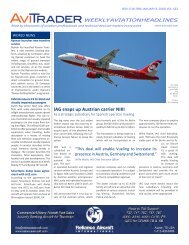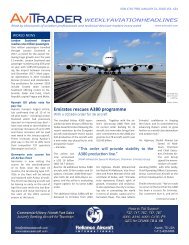AviTrader MRO Magazine 2017-05
AviTrader MRO Magazine 2017-05
AviTrader MRO Magazine 2017-05
Create successful ePaper yourself
Turn your PDF publications into a flip-book with our unique Google optimized e-Paper software.
Industry opinion<br />
30<br />
Big data takes off….<br />
with predictive maintenance<br />
Big data has the potential to transform the <strong>MRO</strong> supply chain.<br />
Photo: Lufthansa<br />
I<br />
n aviation, downtime is money. Whether it’s a plane that’s not performing<br />
any functions while waiting for a part to come in, or it’s<br />
overtime pay to get that part installed when it finally does come in,<br />
the time it takes to replace parts (from sourcing it at the right price<br />
to receiving and installing it) comes with a hefty price tag.<br />
Predictive maintenance for the supply chain, however, is a big game<br />
changer. Predictive maintenance harnesses the power of big data<br />
to get customers the parts they need when they need them and at<br />
the price points they want. Accessing data around certain parts and<br />
aircrafts, this data-driven approach is able to predict when a part<br />
will be needed.<br />
Clearly, it has the potential to transform the <strong>MRO</strong> supply chain. Before<br />
big data entered the picture, <strong>MRO</strong> managers were left to beg, borrow<br />
or steal to ensure the right parts were available at the right time. The<br />
goal was always to keep planes in the air and not in the repair cycle<br />
- but without a predictive understanding of which parts would need<br />
replacement and when - the goal wasn’t always achievable.<br />
For companies who want a competitive advantage within the aviation<br />
industry, tapping suppliers who use big data gives them an edge.<br />
From keeping repair cycle time at a minimum to sourcing the best<br />
pricing for a part, reliably fast access to spare parts at competitive<br />
pricing has the potential to transform operating costs.<br />
Exodus Aviation, a commercial aviation asset manager specializing<br />
in Airbus and Boeing parts, uses the Talend software to predict maintenance<br />
trends on specific part numbers for a given aircraft and, in<br />
turn, orders repairs on units.<br />
According to Chris Santana, Exodus Director of Sales and Strategy,<br />
his company saw the potential ROI that big data could bring to customers<br />
and jumped on it. “This data-driven approach to parts ordering<br />
reduces the mean-time-to-repair while keeping costs down for<br />
our customers. There’s a shift happening and it’s about time. ”<br />
Using predictive maintenance, Exodus has the units their customers<br />
need ready to go as soon as they need them. No need to park or<br />
down the aircraft waiting for a certain part to come in: instead, the<br />
aircraft is kept flying and the maintenance schedule isn’t side-lined.<br />
Beyond just having parts ready at competitive prices, customers who<br />
use Exodus for parts sourcing are able to better plan ahead for repairs<br />
that will be needed and, in doing so, allocate resources appropriately.<br />
Data-driven approach is able to predict when a part will be needed.<br />
Photo: Boeing<br />
“The ability to predict which parts our customers will need not only<br />
gives our customers an advantage; it gives us a big one, too.” Santana<br />
remarked. “It’s really a win-win...thanks to big data, we are<br />
able to offer unparalleled service and pricing that’s made us a go-to<br />
within our niche.”<br />
<strong>AviTrader</strong> <strong>MRO</strong> - May <strong>2017</strong>


